Manoeuvring Through the Dark with Sandra Mujinga
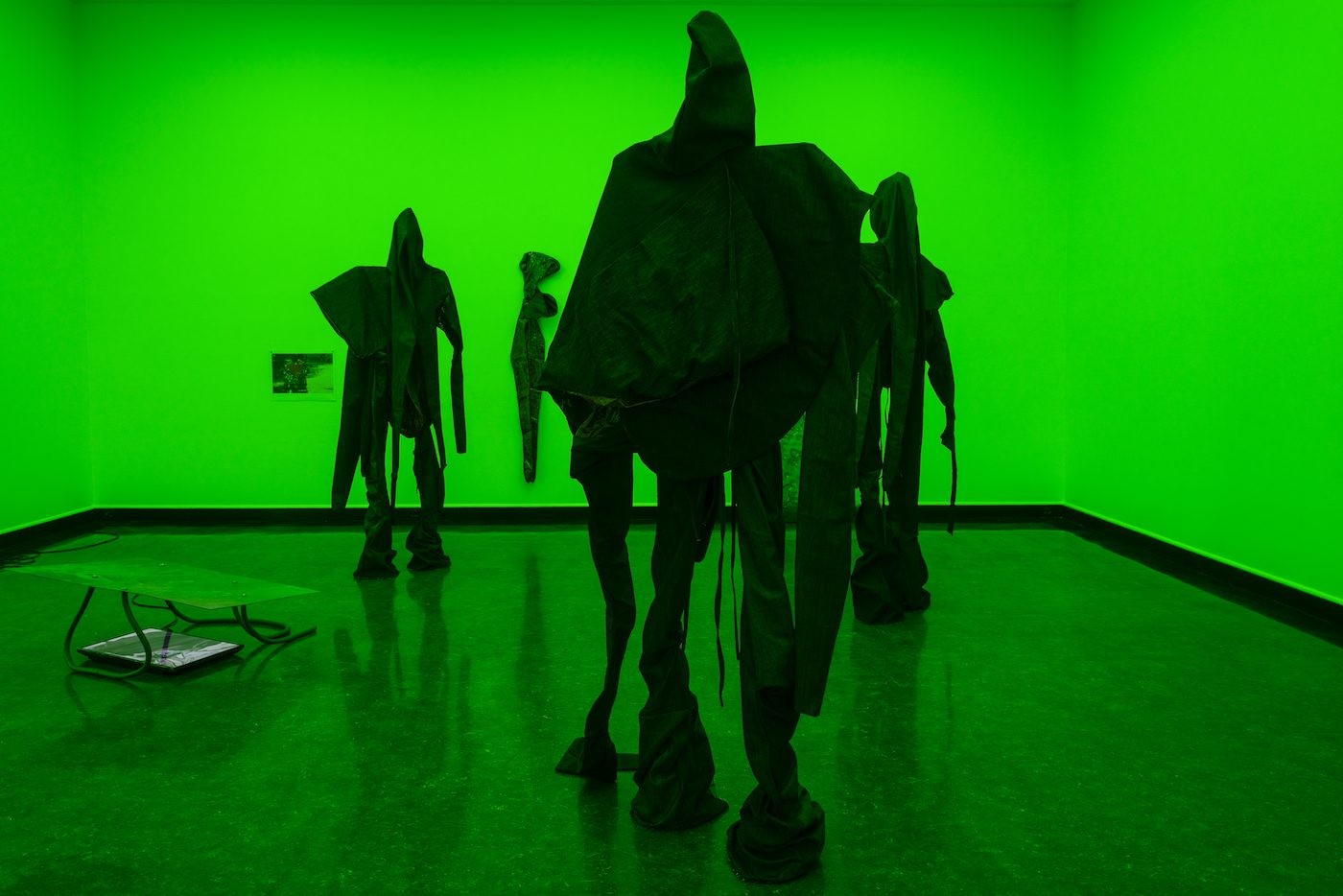
Despite its colonial history, the Nordics don’t have large communities of people of African descent as in other areas in Europe. This has contributed to many Afro-Scandinavians growing up in isolation with a complex sense of belonging. Today, however, there are a number of artists embracing their layered history and identity which they explore through multiple art practices. In the series The Nordics: Out of the Shadows we meet some of these artists. Sandra Mujinga’s exhibition SONW: Shadow of New Worlds at Bergen Kunsthall is her largest solo presentation to date. The artist presents sculpture, photographs, and large-scale video installations in Norway, as well as a performance of her play You Are All You Need. She draws on world-building and sci-fi through her various media. C& talked to Mujinga about hiding as a strategy to manoeuvre through the dark, about belonging in different spaces, and about where all the Black people go.
Contemporary And: What are the narratives behind Shadow of New Worlds?
Sandra Mujinga: There are several narratives, and overall the exhibition is about manoeuvring through the dark. There was this racist joke I would get as a kid, when taking a photo with my white friends: “Oh, you’re so dark. We can barely see you.” I have thought about it quite a lot, and recently it seemed almost like a gift: not being seen, not being captured through this technological lens. It’s about thinking through skin colour, through melanin and deep tones. How it can be like a superpower, that you can actually manoeuvre through the dark?
C&: Which elements of science-fiction and Afrofuturism are you particularly drawn to?
SM: I am most drawn to is the freedom of re-imagining different bodies. For instance, Octavia Butler’s idea of how humans are not going to survive and have to mate with extra-terrestrials. Quite often science fiction is about how we will survive, but Butler is not afraid to say that maybe it’s not our turn anymore. In speculative fiction written by Black women I’ve often seen that the depiction of Black bodies is different to how we otherwise see it in media and film.
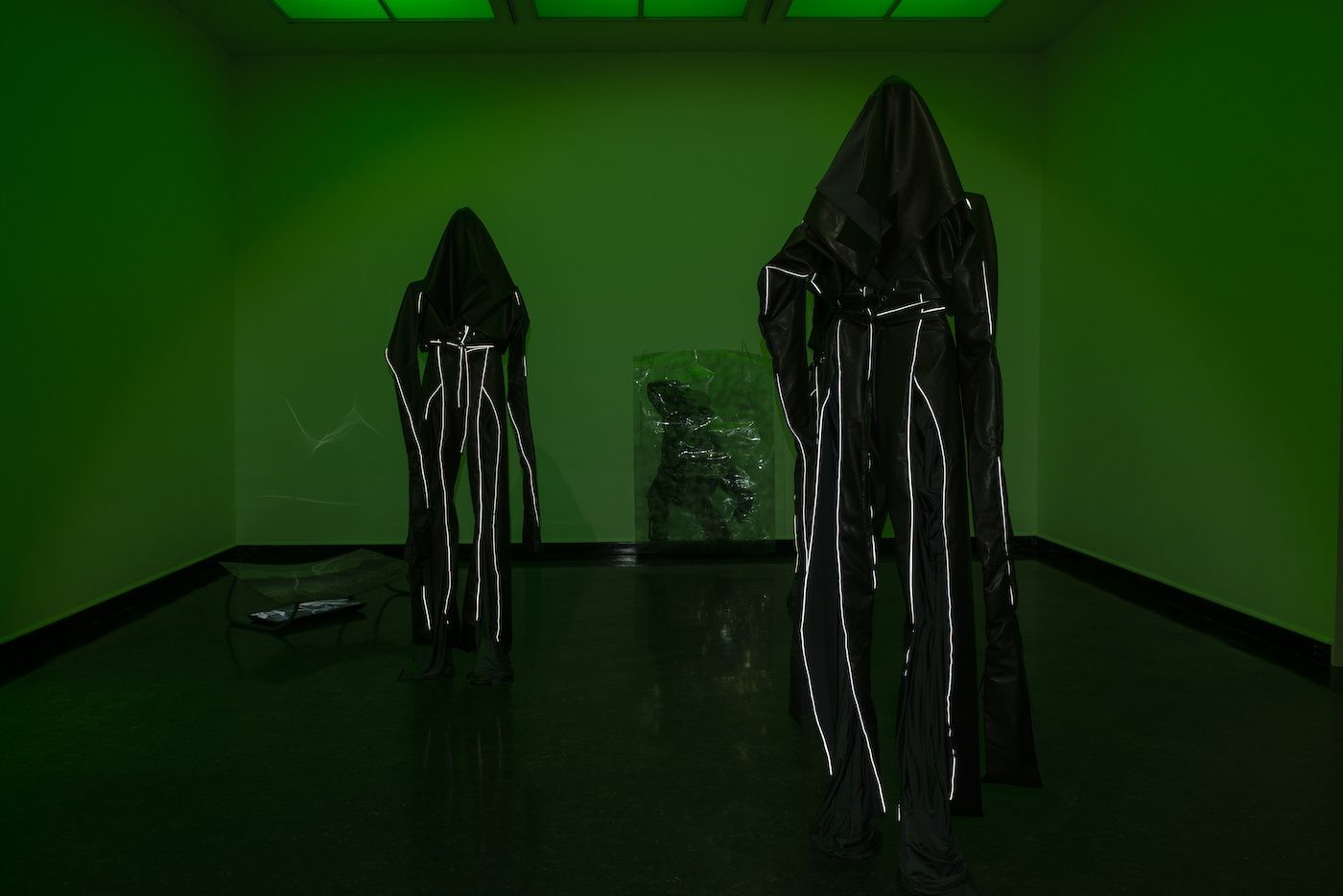
Sandra Mujinga, Nokturnal Kinship 1-3, 2018. Coated PU leather, gormets, polyester, lycra fabric, reflector fabric. Ca: 270 x 80 x 50 cm each.
C&: In your exhibition you present shadows not as a weakness but rather as a deliberation. Why?
SM: It’s like a deliberate hiding. There is some empowerment in not getting the light. I often ask myself: what does it mean to be successful and enter the spaces that were not made for you, that you were excluded from to begin with? There is something quite empowering in thinking about where you are situated and how you can grow superpowers in that space.
C&: You are based in both Oslo and Berlin, and throughout your career you have lived in many areas. How do you engage with people in all the different places you go to?
SM: I use Instagram, despite the complexity of an online presence. On Instagram you can find people that you otherwise don’t see. For me that is quite refreshing, because when I was a teenager I didn’t have access to movements like #BlackGirlMagic. You just had to deal with the isolation, while today you can write to someone on Instagram and they respond immediately. I think this is really important when you are a minority in a specific context, dealing with certain questions to which you don’t get the feedback you need. But I also find people through stopping them in the streets – I do that quite a lot.
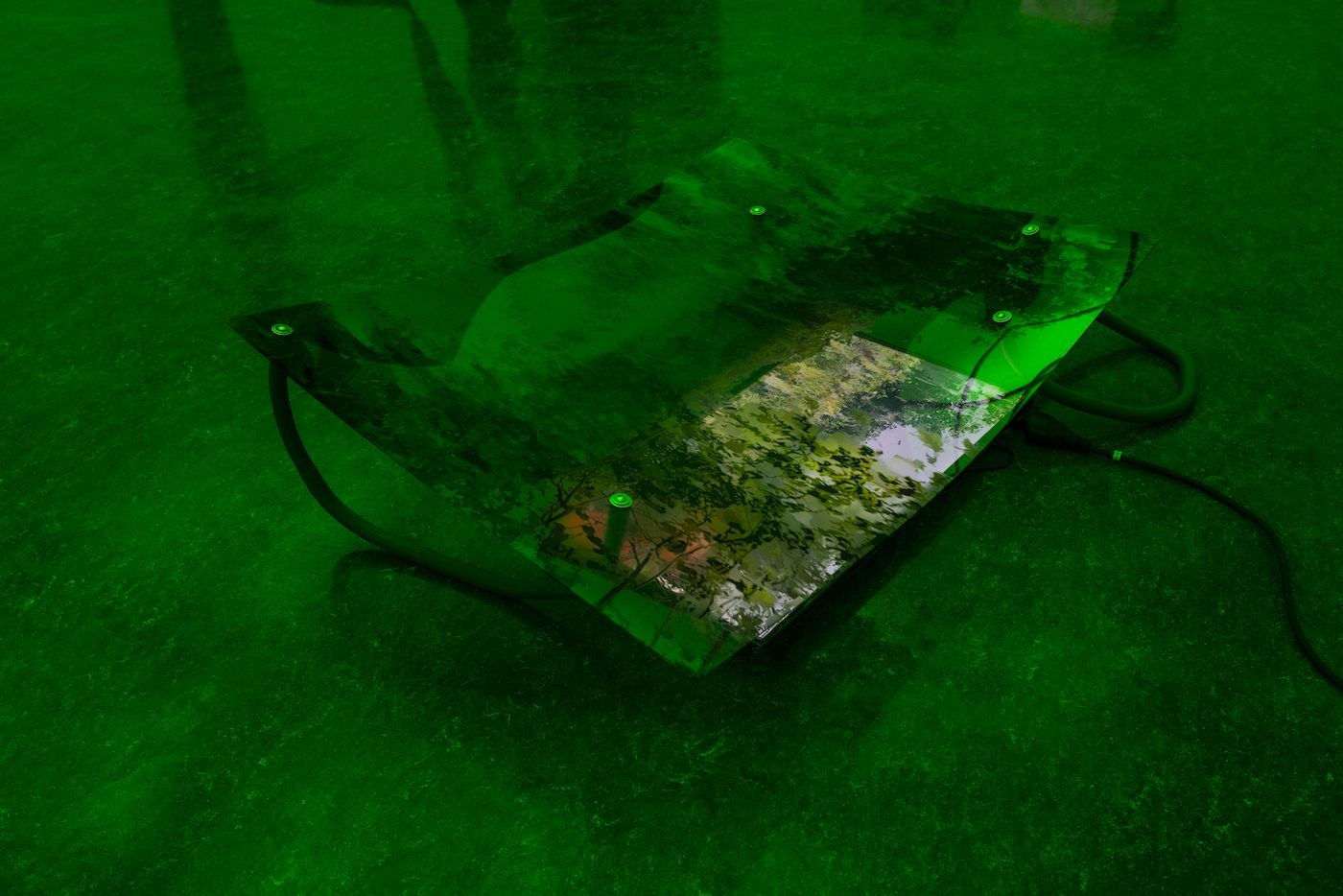
Sandra Mujinga, Stretched Delays 2, 2017. HD video (13 mins. loop), 32 inches LED TV, digital print on clear plexi glass (120 x 90 x 3 cm), steel and silicone rubber. Dancer: Nasheeka Nedsrea
C&: You speak of deliberate hiding, but isn’t being online a very public thing?
SM: I think being online also means making a living. It’s how people survive today. I don’t want to have this purist idea of having to cut one’s online activities. I am more interested in creating artworks or having a practice where I can raise these questions, where I can talk about representational politics and about how tokenization is a thing. I can do that through my art, and when I am online. It gives me access to working with different communities. I like doing things as a group. For this show I have curated a panel discussion with Christelle Oyiri, Jeannette Ehlers, Samuel Girma moderating, and myself.
C&: Various articles in Norway about you and your work solely describe you as a Norwegian artist and don’t address your Congolese heritage. Do you have a sense of belonging to Norway?
SM: I get semi-provoked when people only write “Congolese artist.” I am proud of my heritage, but if you actually want a Congolese artist you have to sit and write a visa application, apply for funding, and book the ticket to actually get them to Norway. It’s a difficult process. And I think we shouldn’t play with ideas that look nice on paper but not really do the work to make them reality. That is why I stress that I am a Congolese-Norwegian, or Congolese who works in Norway and has a Norwegian passport.
My dream is to have more representation, and having Congolese artists being able to travel and show different sides of themselves would be a step forward. I have a sense of belonging in Norway and Congo. It has a lot to do with my upbringing that am able to manoeuvre, to be at several places at the same time. But I do not agree on the premise of what it means to belong in Norway. I think that’s what should be more discussed, because sometimes I feel like it is an identity cliché. I have noticed, on social media especially, how young Black Norwegians demonstrate this pride in not hiding, this acceptance. There is an energy there, and I think it’s because they don’t feel so isolated and they can connect with other people. But Norway still has to step up and catch on with the rest of the world, otherwise this society is going to drown. Again, it is about having more people in productions that are multicultural. But things are gradually happening.
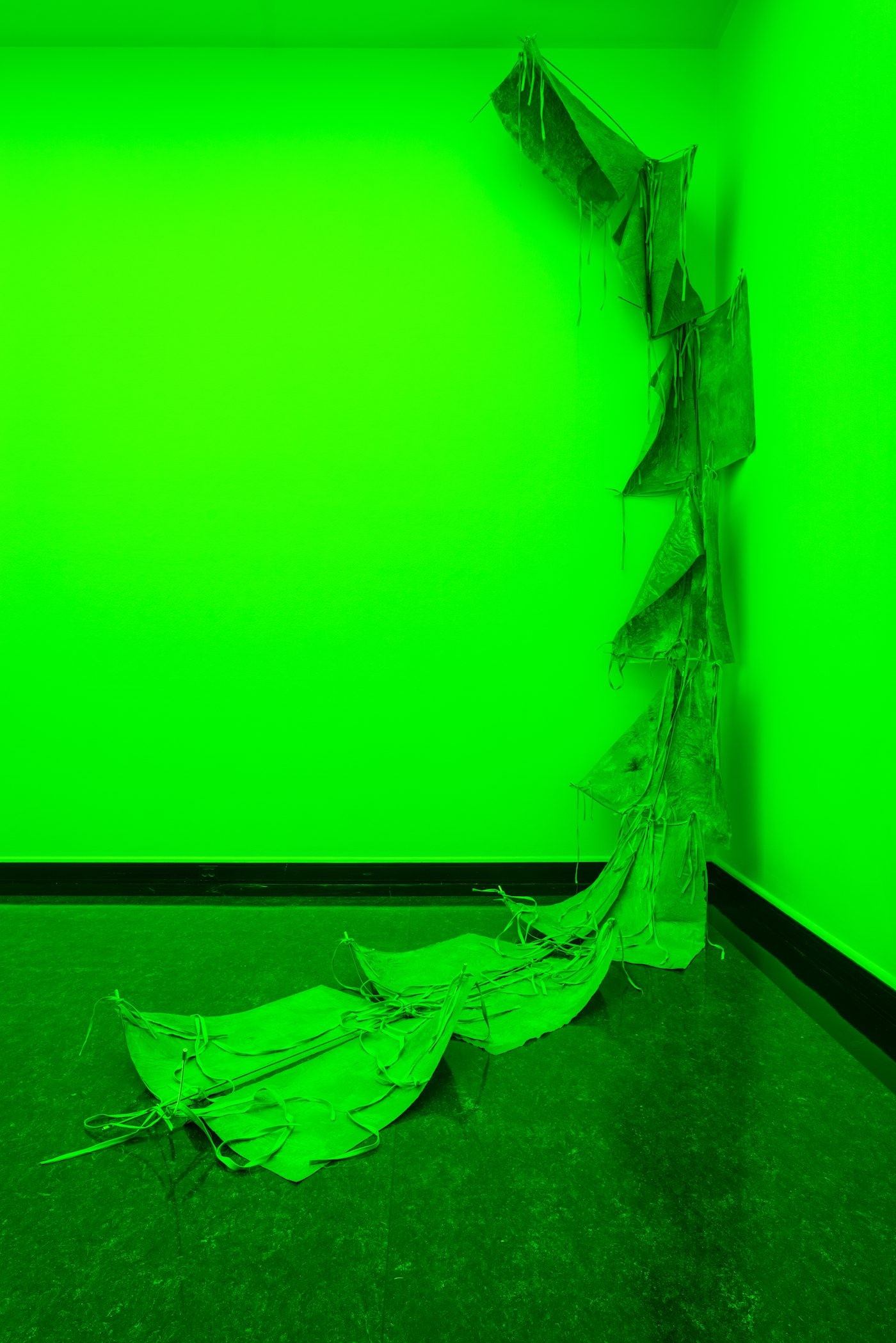
Sandra Mujinga, Coiling, 2019. Soft PVC, cotton, acrylic paint, glycerine, threaded rods and rod couplings. 800 x 100 cm.
C&: What are your general thoughts on diversity and inclusion in Norway?
SM: For me diversity is also about the taxpayer’s money. People pay taxes for these cultural institutions, but they are not included and do not see themselves represented. There has to be more effort in making people feel like they belong. There might be a sense of belonging when it comes to hip hop dance or slam poetry. But why not ballet? I also make an effort in my collaborations, for instance through inviting and working with two Afro-Norwegians in You Are All You Need, where they can also bring in their communities. I noticed that it didn’t make sense to be in a space that is completely and predominantly white. Music is a space where you get access to more diverse people, while visual arts are still not there yet – at least in Norway.
C&: You raise an interesting question in You Are All You Need, and I would like to direct it toward you: Where are all the Black people in the future?
SM: I think the longer you are in a dark room your eyes start to adjust and see things, and from there you can manoeuvre through it. So for me the future is about this utopian possibility of being in charge of your visibility. Because up till now Black bodies are either visible and being policed, or they’re completely invisible. Ultimately Shadow of New Worlds is about the hope that you will be able to control your visibility and safety.
Sandra Mujinga’s SONW: Shadow of New Worldsis at Bergen Kunsthall, Bergen, Norway until January 19, 2020.
Sandra Mujinga was born 1989. She lives and works in Berlin and Oslo.
Sheila Feruzi is an afro-Norwegian screenwriter and film producer currently based in Bergen, Norway. Through the upcoming media company Vuma she is developing podcasts and digital media solutions that will highlight content by multicultural creators in Norway.
In Conversation
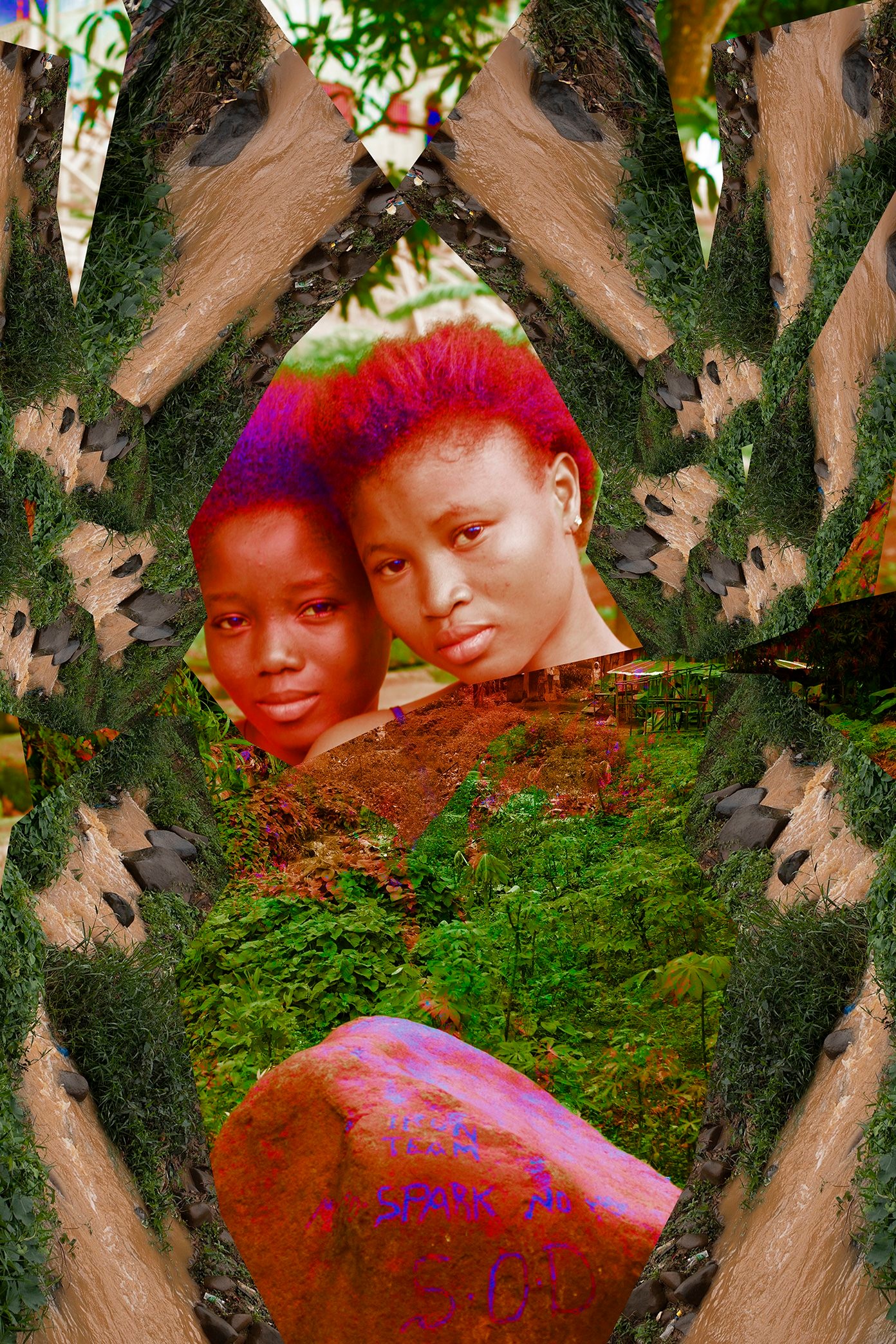
The Deconstructive Lens of Ngadi Smart: From Drag to Climate Change
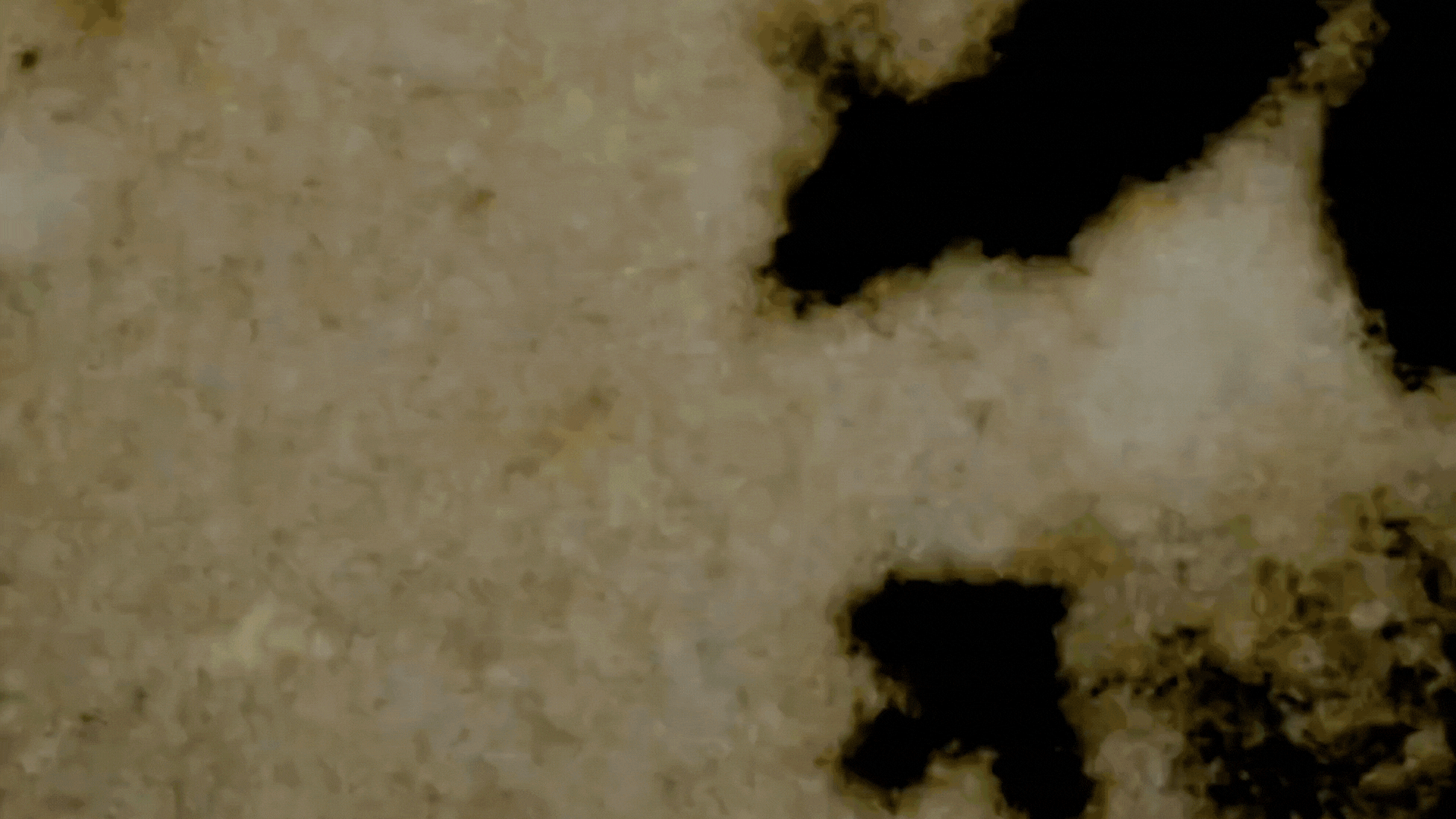
On Ghosts and The Moving Image: Edward George’s Black Atlas
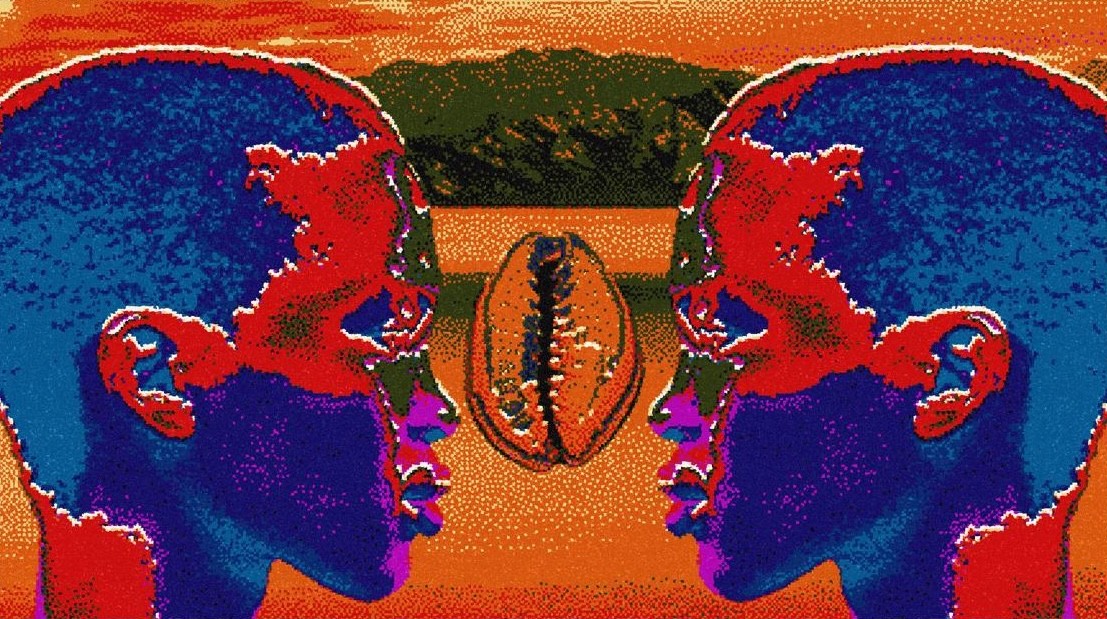
On Exile, Amulets and Circadian Rhythms: Practising Data Healing across Timezones
In Conversation

The Deconstructive Lens of Ngadi Smart: From Drag to Climate Change

On Ghosts and The Moving Image: Edward George’s Black Atlas
